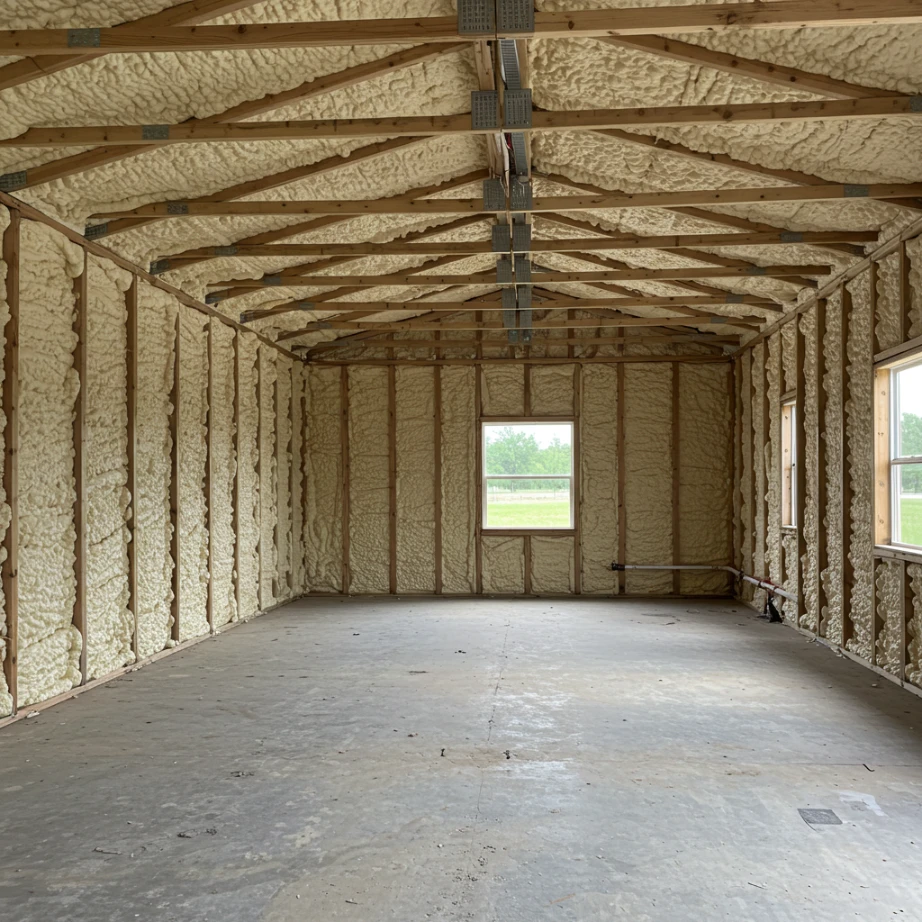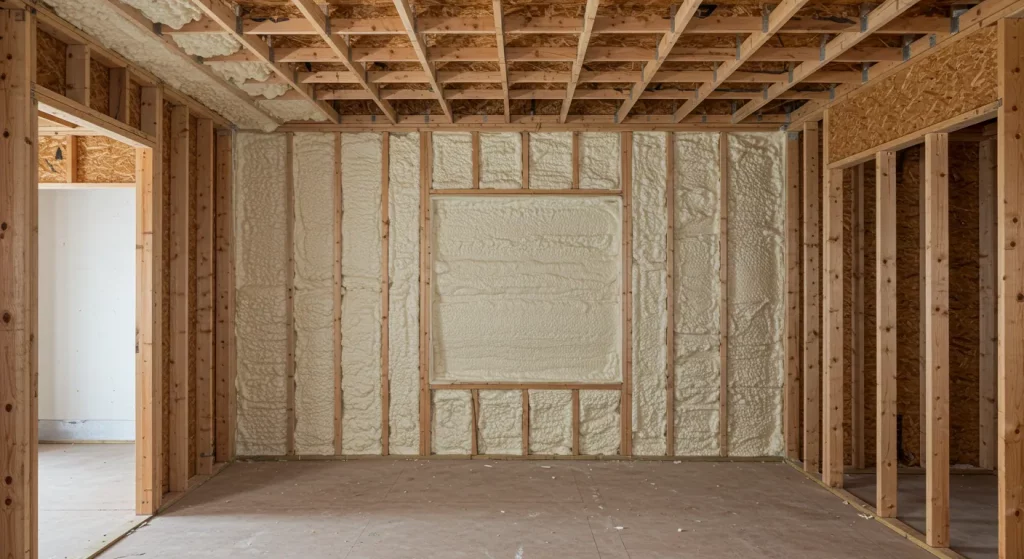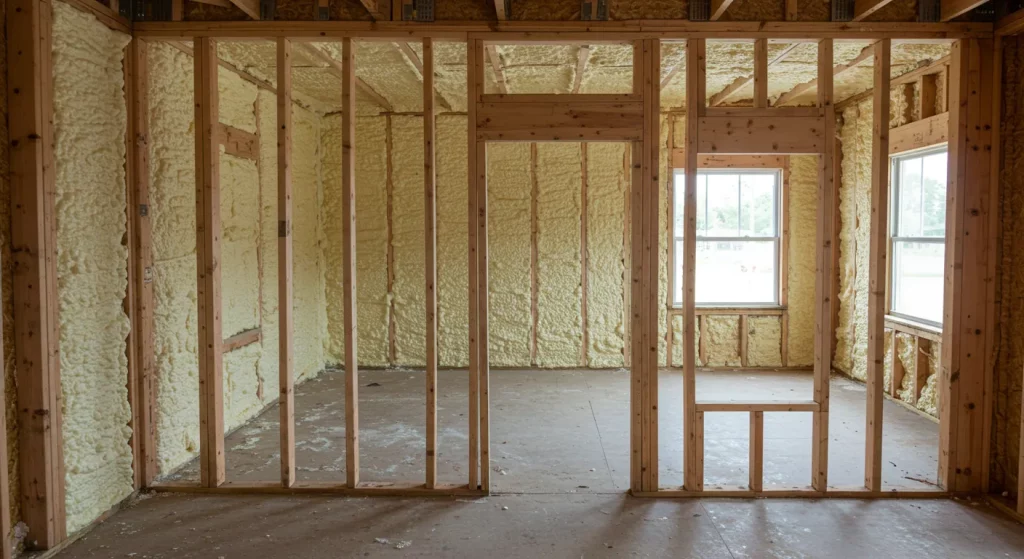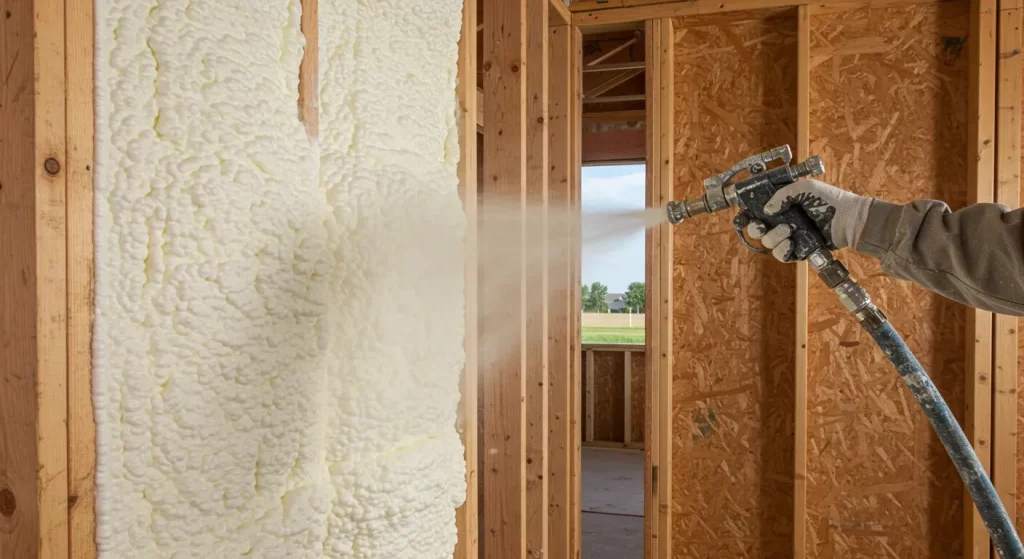Spray foam insulation is a highly effective material for soundproofing homes because it attacks noise on two fronts. First, by expanding to fill every crack and crevice, it creates a complete air seal that blocks the path of airborne sound waves. Second, the cellular structure of the cured foam itself absorbs and dampens sound vibrations, further reducing noise transmission. This dual-action approach makes it a powerful solution for homeowners looking to create a quieter indoor environment, especially in a growing area like Raleigh where external noise from traffic and construction is common.
How Spray Foam Insulation Controls Noise
Understanding how sound travels is key to understanding how spray foam stops it. Sound moves through buildings primarily as airborne noise (voices, music, traffic) and structure-borne or impact noise (footsteps, dropped objects). Spray foam insulation excels at controlling airborne noise.
When installed, the foam expands and hardens into a solid mass with millions of tiny air pockets. This structure is difficult for sound waves to travel through. Open-cell spray foam, in particular, has a softer and more flexible texture that is excellent at absorbing sound energy. The Spray Polyurethane Foam Alliance clarifies that this process of sound absorption and dampening significantly improves the Sound Transmission Class (STC) rating of a wall assembly. According to the U.S. Department of Energy, the air-sealing properties of spray foam are another major reason for its effectiveness in reducing noise transmission from the outdoors.
Open-Cell vs. Closed-Cell for Sound Absorption
While both types of spray foam provide thermal insulation, they have different properties when it comes to sound control. Open-cell foam is generally the preferred choice for soundproofing interior walls, while closed-cell offers other benefits that might make it suitable for specific applications.
| Feature | Open-Cell Spray Foam | Closed-Cell Spray Foam |
|---|---|---|
| Sound Absorption | Excellent; soft, porous structure absorbs sound waves effectively. | Good; dense structure blocks sound, but is less absorptive. |
| Density | Low (approx. 0.5 lbs per cubic foot) | High (approx. 2.0 lbs per cubic foot) |
| Air Barrier | Yes | Yes |
| Moisture Barrier | No (permeable to vapor) | Yes (impermeable to vapor) |
| Application | Interior walls, ceilings, attics for sound control. | Exterior walls, basements where moisture barrier is needed. |
| Cost | Lower | Higher |
Bonus Tip: For dedicated spaces like a home theater, a recording studio, or a nursery, using open-cell spray foam in the interior wall cavities is one of the most effective ways to isolate sound and prevent it from disturbing the rest of the house.
Practical Applications in a Raleigh Home
Noise can come from many sources, both inside and outside the home. Spray foam insulation can be strategically applied to address the most common problem areas.
Quieting Exterior Walls
With the steady growth in the Triangle area leading to more traffic and development, external noise is a growing concern for many residents. For homes near busy roads, construction sites, or close neighbors, applying spray foam to exterior walls can make a significant difference. The continuous layer of insulation seals off common entry points for sound, such as gaps around wiring, plumbing, and window frames.
Reducing Noise Between Rooms
One of the most popular uses for sound-dampening insulation is in interior walls and ceilings. This is perfect for:
- Home Offices: Creating a quiet space for focused work, free from household distractions.
- Bedrooms: Ensuring a peaceful environment for rest by blocking noise from living areas.
- Laundry Rooms: Containing the sound of washing machines and dryers.
- Bathrooms: Adding privacy by dampening sounds.
Dampening Floor and Ceiling Noise
Applying spray foam to the cavities between floors is an effective way to reduce the transmission of both airborne sound (like conversations from a lower level) and some impact noise. While it won’t completely eliminate the sound of heavy footsteps, it will muffle it considerably, leading to a quieter and more serene living space.
Key Factors to Consider
Before committing to spray foam for soundproofing, it’s important to evaluate a few key factors to ensure it’s the right solution for your specific needs.
- Identify the Type of Noise: Is the primary issue airborne noise like traffic and voices, or impact noise like footsteps from an upper floor? Spray foam is a top-tier solution for airborne noise. For severe impact noise, it should be paired with other solutions like dense floor underlayments or resilient channels.
- Project Timing: Installing spray foam is most efficient and cost-effective during new construction or a major renovation when wall cavities are exposed. Retrofitting an existing home is possible, but it requires more labor to access the spaces that need insulation.
- Overall Goals: Are you looking for just sound control, or do you also want to improve energy efficiency? Spray foam is a powerful two-in-one product that provides superior thermal insulation alongside its acoustic benefits. This combination can increase a home’s comfort and potentially its resale value. A report from the National Association of REALTORS® highlights that insulation upgrades can offer a strong return on investment.
Bonus Tip: Don’t overlook windows and doors. Sound acts like water, finding the easiest path. Even with perfectly insulated walls, old or poorly sealed windows and doors can still let in a lot of noise. Upgrading or sealing them is an important part of a complete soundproofing strategy.
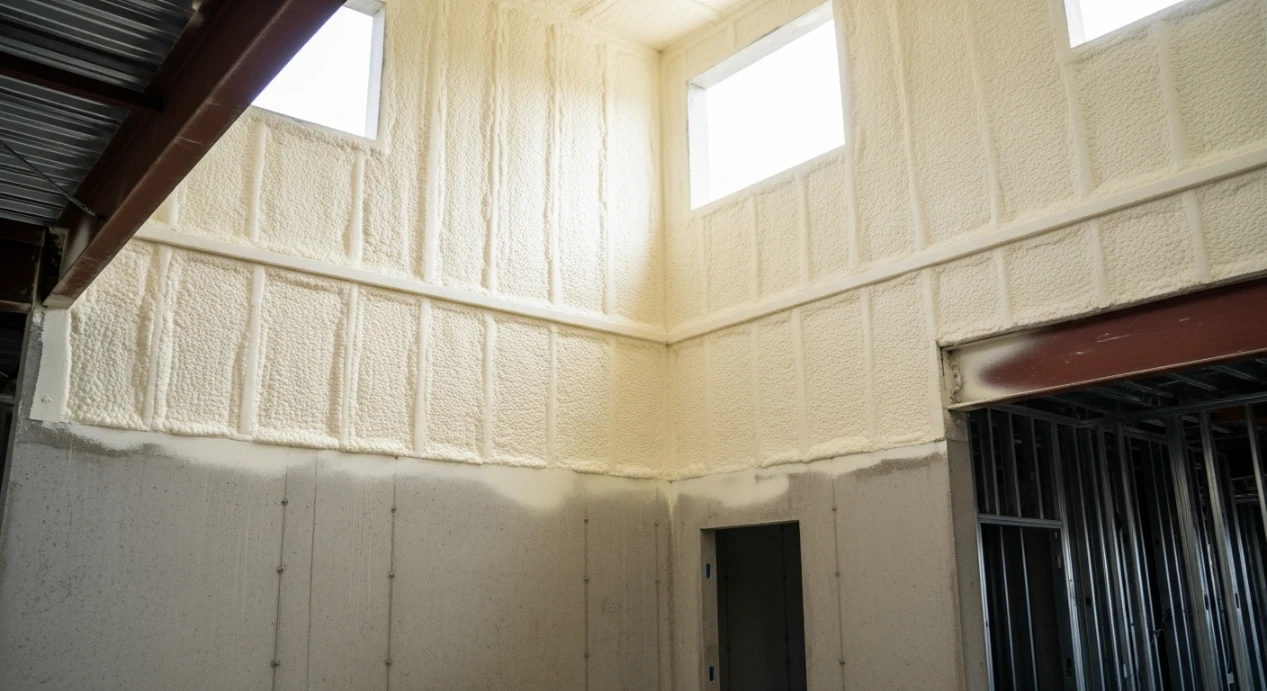
Making the Right Choice for a Quieter Home
For homeowners in Raleigh seeking relief from unwanted noise, spray foam insulation offers a robust and lasting solution. Its dual-action approach to sound control and thermal performance makes it a smart investment for a more comfortable, peaceful, and energy-efficient home. Before moving forward, assess your home’s specific noise issues to determine where this application would provide the most benefit.
Raleigh Excel Spray Foam Insulation recently tested new foam materials, showing enhanced soundproofing and thermal performance for homes. These results highlight how modern insulation can make living spaces quieter and more energy-efficient.
Get a Professional Assessment
Every home has unique acoustic characteristics. To understand the best approach for soundproofing your property, a professional evaluation is recommended. The team at Raleigh Excel Spray Foam Insulation can provide a thorough assessment and explain how different insulation strategies can meet your goals. For a detailed consultation, please call (919) 301-9435 or send an email to [email protected].
Sources
- U.S. Department of Energy – This resource provides official information on different types of insulation, including the air-sealing and noise-reduction benefits of spray foam.
- Spray Polyurethane Foam Alliance – This organization offers technical details on the acoustic performance of spray foam and its effect on Sound Transmission Class (STC) ratings in building assemblies.
- National Association of REALTORS® – This report discusses the return on investment for home insulation projects, which helps establish the value of such upgrades.
Frequently Asked Questions About Spray Foam and Sound Control
Can spray foam reduce the sound of traffic?
Yes, absolutely. By creating an airtight seal in exterior walls, spray foam is very effective at blocking airborne traffic noise. The foam’s density and structure disrupt the sound waves before they can enter your living space.
Will soundproofing with spray foam increase my home’s value?
While it can be difficult to quantify, features that improve comfort and quality of life, like a quiet interior, are attractive to homebuyers. The combined energy savings and sound reduction make it a valuable upgrade that can contribute positively to a home’s marketability.
Is open-cell or closed-cell foam better for soundproofing?
For pure sound absorption, open-cell foam is the superior choice. Its soft, porous structure is designed to trap and dissipate sound waves effectively. Closed-cell foam is denser and better at blocking sound, but it doesn’t absorb it as well. The best choice often depends on the specific location and goals of the project.
How long does the installation process take?
For a typical residential project, applying spray foam to a specific area like an attic or a set of interior walls can often be completed in a single day. The foam cures quickly, allowing other construction work to resume shortly after.
Does spray foam insulation have any odor after it cures?
Professionally installed, modern spray foam is inert once cured and should not have any lingering odor. A temporary smell may be present during and shortly after application, which is why proper ventilation is managed by the installation crew and homeowners are typically asked to vacate the premises for a short period.




